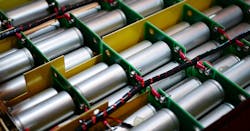Batteries are an exciting space in e-mobility. Scores of companies are racing to find cheaper materials, improve efficiency and increase range—all without adding to charging times, mind you—and it can be difficult to keep up with every notable announcement. To help you stay up to speed, here’s a quick collection of some recent industry news.
Freyr takes on solar
Freyr Battery executives announced they will purchase the U.S. manufacturing assets of Trina Solar Co. as they look to establish themselves in the world of solar energy.
According to a filing by Freyr, the battery company will acquire Trina’s 5 GW solar module manufacturing facility in Wilmer, Texas, near Dallas. The facility began production on Nov. 1 and is expected to ramp up to full production in 2025. So far, 30% of its estimated production volumes are backed by contracts with U.S. customers.
Freyr will pay $340 million in a combination of cash, debt and common stock. The deal is expected to close before the end of the year.
Newly named Freyr CEO Daniel Barcelo and his team plan to quickly build on the Trina deal. Their next move will be to build a 5 GW solar cell manufacturing facility in the United States. Site selection is still ongoing and the Freyr team is targeting a construction start date next spring, with production commencing in the second half of 2026.
Mullen Updates on Upcoming Battery Center
EV maker Mullen Automotive provided an update on the progress at its Fullerton, California, battery center. That facility is expected to begin production in mid-2025 with five total battery lines. To date, three of those have been installed and the final two are slated to be completed between December and February.
Mullen executives have pitched the facility as producing next-generation, American-built, solid-state polymer (SSP) battery packs. SSP batteries generally provide more range, faster charging and better safety compared to lithium-ion batteries.
According to Mullen’s website, the coming battery pack is projected to double the range of the Mullen ONE Class 1 EV cargo van to more than 200 miles on a single charge.
Nxu Preps a Third Act
Leaders of NXU, an energy storage and charging company, announced in late October that they are planning a merger with Verde Bioresins, a sustainable biopolymer resin developer. Under the deal, Nxu acquired all issued and outstanding shares of the company, and pre-Merger Verde stockholders will own approximately 95% of the combined company while pre-merger Nxu stockholders will own the remaining 5%.
Verde, which created PolyEarthylene, one of the first scalable full-service bioresins, is valued at more than $300 million, while Nxu’s is roughly $16 million. The merger is expected to close in the first quarter of 2025.
The newly combined company will trade on the Nasdaq under the ticker “VRDE” as Verde Bioresins Corp. The debut will mark the third distinct stage of Nxu’s corporate life: It originally started at Atlis Motor Vehicles before halting its electric-vehicle manufacturing plans last year to focus on energy storage applications.
NEO Lands Consortium Spot
NEO Battery Materials, a Canadian silicone anode manufacturer, has been named a consortium partner in a $14 million recycled silicon battery project organized by the South Korean Ministry of Trade, Industry and Energy.
The project will focus on developing high-performance silicon anode materials based on recycled silicon scrap. NEO will contribute by jointly developing the materials to manufacture high-content silicon anode batteries.
